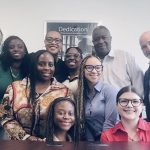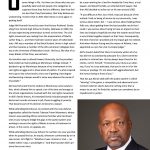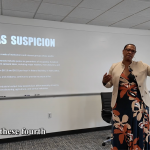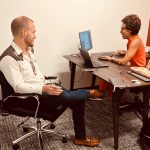





Since the launch of the Criminal and Civil Justice Institute (CCJI) at Atlanta’s John Marshall Law School (AJMLS), this fall has been packed with meaningful events, connections, and momentum, beginning with Justice in Action (Aug. 15), where members of the Criminal Law Society joined Professor Jonathan Rapping and CCJI Executive Director Sam Starks to build connections rooted in advocacy. At the same time, CCJI leaders and interns rolled up their sleeves on urgent work, including a jail death case, underscoring the institute’s commitment to blending classroom learning with real-world impact and setting the tone for the months that followed.
That commitment was formally introduced to the wider student body during CCJI Orientation (Aug. 18), which prepared students for a year of programming, mentorship, and engagement within the AJMLS community. The spirit of mentorship quickly came to life through conversations with practitioners such as Attorney Brandi Harden (Aug. 23), who shared candid insights from her career in criminal practice, and Staff Attorney Erin Coleman (Aug. 27 and Sept. 5), who offered practical guidance on transitioning from law school to the profession. These early sessions highlighted the institute’s dual focus on academic development and practical preparation.
As September unfolded, the conversation widened to address both systemic issues and professional identity. Harden returned (Sept. 7) to lead students in a thoughtful discussion of the prison industrial system, challenging them to critically examine the structures that shape the criminal legal process. Soon after, CCJI’s presence on campus became even more visible with the unveiling of new signage (Sept. 8), signaling the institute’s permanence and importance within the law school community. That same week, Judge Akil Secret, Senior Law Partner with CCJI, was recognized in CODE Magazine for his long-standing commitment to civil rights and underserved communities. His recognition not only reflected his personal dedication but also reinforced the values at the heart of CCJI’s mission.






In addition to recognition and dialogue, the semester emphasized authentic collaboration. Students shared meals and conversations with attorneys such as Brian Orozco (Sept. 9), gaining candid perspectives on the practice of law, while others partnered directly with CCJI’s staff attorneys to contribute to active litigation in criminal defense, civil rights, and personal injury cases. Alumni also returned to mentor current students, creating a network of support that bridged experience with aspiration.
The month concluded with a focus on professional growth beyond the courtroom. On Sept. 12, CCJI partnered with the Georgia Association of Black Women Attorneys (GABWA) to host Morgan Wider, an executive image strategist, who led an engaging session on how image and intention shape professional presence. This event underscored the institute’s holistic approach to preparing advocates who are not only skilled in law but also confident in how they present themselves in the broader professional world.
Taken together, these events paint a clear picture: CCJI is more than a new academic center. It is a living, breathing community of students, faculty, attorneys, and alumni dedicated to advancing justice. From hands-on casework to system-level conversations to professional development, CCJI has created a rhythm of learning that blends the intellectual, the practical, and the personal.
As the semester continues, CCJI is poised to expand on this strong beginning. More programs, litigation opportunities, and mentorship connections are already on the horizon. If the first weeks are any indication, the Criminal and Civil Justice Institute will not only prepare AJMLS students for their legal careers but will also shape them into advocates capable of driving change well beyond the classroom.
